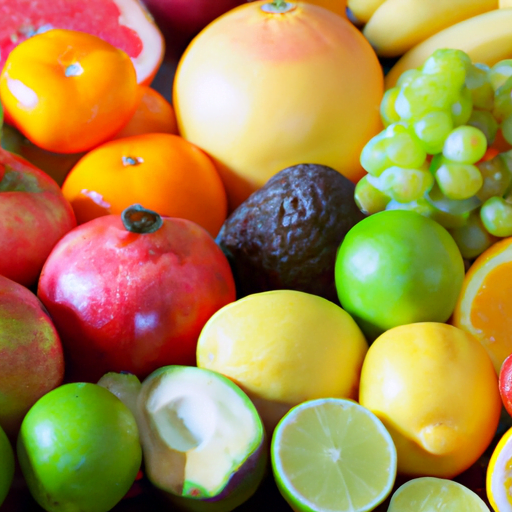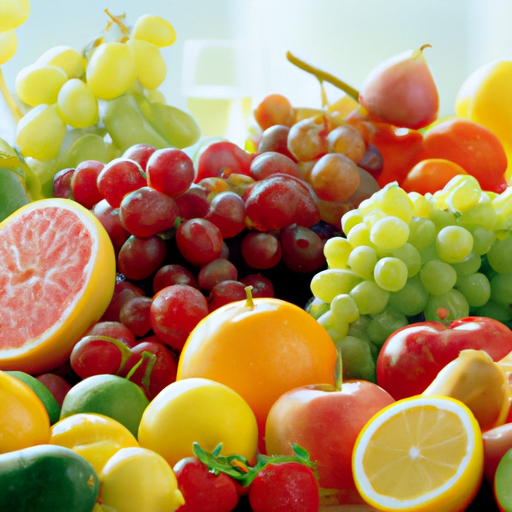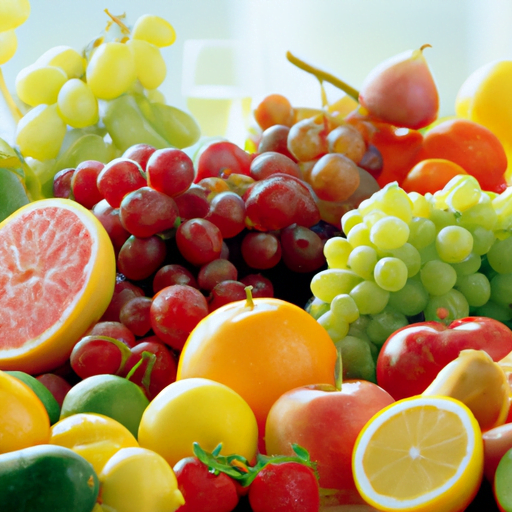So, you’re interested in off grid living, huh? That’s awesome! There’s something so freeing about being self-reliant and living off the grid. One thing you might be wondering when it comes to off grid living is what fruits you should avoid refrigerating. Well, lucky for you, I’ve got some answers! In this article, we’ll dive into the best fruits to avoid refrigerating and why. Trust me, you’ll be surprised at some of the fruits that actually do better when stored at room temperature. It’s all about understanding the nature of these fruits and how they ripen. So, let’s get started and learn more!
Now, let’s talk about the fruits that you should avoid refrigerating. Did you know that bananas are actually better off at room temperature? That’s right, refrigerating them can actually slow down the ripening process. So, if you want those bananas to reach that perfect level of ripeness, keep them out of the fridge. Another fruit that you should avoid refrigerating is the avocado. Avocados need time to ripen properly, and refrigeration can stunt that process. You’ll want to store them on the counter until they’re ripe and ready to eat.
Another fruit that should be kept out of the fridge is the pineapple. This tropical fruit thrives at room temperature and refrigerating it can actually spoil its flavor and texture. So, unless you want a bland and mushy pineapple, avoid putting it in the fridge. And lastly, one fruit that might surprise you is the tomato. Yes, technically it’s a fruit! Tomatoes tend to lose their flavor and become mealy when refrigerated. It’s best to store them at room temperature to maintain their delicious taste.
So, there you have it! The best fruits to avoid refrigerating. We’ve talked about bananas, avocados, pineapples, and tomatoes. These fruits all have one thing in common – they thrive when stored at room temperature. Now that you understand the importance of proper fruit storage, you can ensure that your off grid lifestyle includes the freshest and tastiest fruits. If you want to learn more tips and tricks for off grid living, be sure to check out our full article. Stay tuned and happy off grid living!

The Best Fruits to Avoid Refrigerating
In today’s fast-paced world, refrigeration has become an essential part of our daily lives. It helps us preserve food, extend its shelf life, and maintain its freshness. However, when it comes to fruits, refrigeration is not always the best option. Certain fruits have specific requirements and characteristics that make them unsuitable for storage in the refrigerator. Understanding which fruits should be kept out of the cold can help you enjoy their optimal flavors and textures, while also minimizing waste and food spoilage.
Understanding the Nature of Fruits
Fruits are delicate and complex organisms that have their unique needs for ripening, flavor development, and texture maintenance. Refrigeration disrupts these processes and can lead to undesirable changes in the fruits’ taste, texture, and appearance. It is essential to understand the different effects of refrigeration on fruits to make informed decisions about their storage.
Effects of Refrigeration on Fruits
Refrigeration alters the natural ripening process of fruits. The cold temperature slows down the enzymatic activities responsible for ripening and can cause the fruits to remain under-ripe or lose their flavors. Additionally, the moisture inside the refrigerator can cause fruits to become mushy or develop an unpleasant texture. Furthermore, refrigeration can lead to the loss of volatile compounds responsible for the fruits’ aroma and taste, resulting in a less enjoyable eating experience.
Advantages of Avoiding Refrigeration
By avoiding refrigeration, you can preserve the freshness, texture, and flavors of certain fruits. Storing these fruits at room temperature can allow them to ripen properly, develop their full flavors, and maintain their desired textures. Not only will this enhance your eating experience, but it will also reduce food waste and spoilage. Let’s take a look at some of the fruits that are best kept away from the refrigerator.
Highly Perishable Fruits
Bananas
Bananas are one of the most widely consumed fruits worldwide and are best kept on the countertop. Refrigerating bananas can disrupt their natural ripening process, causing them to turn black and lose their natural sweetness. Instead, keep them at room temperature and separate them to prevent over-ripening.
Peaches
Peaches are delicate fruits that are highly susceptible to chilling injury. Refrigeration can cause the flesh to become grainy and lose their natural juiciness and sweetness. To enjoy the best flavors and textures, keep peaches at room temperature until they are fully ripe.
Mangoes
Mangoes are tropical fruits that need warmth to ripen correctly. Refrigerating mangoes can hinder their ripening process, resulting in a flavorless and fibrous fruit. It is best to store mangoes at room temperature until they are ready to eat.
Tomatoes
While tomatoes are commonly stored in the refrigerator for longer shelf life, refrigeration can affect their flavor and texture negatively. Cold temperatures can cause the tomatoes to become mealy and lose their natural juiciness. Instead, keep tomatoes at room temperature until they are fully ripe for the best taste and texture.
Delicate Fruits with Texture Changes
Pears
Pears are delicate fruits that can bruise easily. Refrigeration can accelerate the ripening process and result in a mushy texture. To maintain their crispness and flavor, store pears at room temperature and check for ripeness by gently pressing near the stem.
Avocados
Avocados are best kept at room temperature to ripen properly and develop their creamy texture. Refrigerating unripe avocados can delay their ripening and may result in a bitter taste. Once ripe, you can refrigerate avocados to slow down the ripening process, but it is best to consume them within a few days.
Papayas
Papayas are tropical fruits that need warmth to ripen correctly. Refrigeration can cause the fruit’s texture to become mushy and affect its sweet and tangy flavor. Keep papayas at room temperature until they are fully ripe for the best eating experience.

Fruits Prone to Flavor Loss
Strawberries
Strawberries are delicate fruits with a high water content. Refrigeration can cause them to become watery and lose their sweet and tangy flavors. It is best to consume strawberries shortly after purchasing or store them in a cool and dry place for a short period.
Raspberries
Similar to strawberries, raspberries are fragile fruits that can lose their flavor when refrigerated. Cold temperatures can cause raspberries to become mushy and lose their distinctive sweet and tangy taste. Consume raspberries shortly after purchase for the best flavor.
Pineapples
Pineapples are tropical fruits with a unique combination of sweetness and acidity. Refrigeration can inhibit the enzyme responsible for the fruit’s flavor development, resulting in a less flavorful fruit. To enjoy the full flavors of a pineapple, store it at room temperature until ripe.
Citrus Fruits
Citrus fruits such as oranges, lemons, and grapefruits have a longer shelf life and can be stored in the refrigerator. However, refrigeration can dull their flavors and reduce their juiciness. If you prefer to consume citrus fruits at room temperature, keep them outside the refrigerator for a more vibrant taste.
The Importance of Ripening
Understanding the Ripening Process
Ripening is a natural process that transforms fruits from under-ripe and firm to ripe and soft. This process involves the enzymatic breakdown of complex compounds into simpler ones, resulting in the development of flavors and aromas.
Enhancing Ripening for Optimal Flavors
To enhance the ripening process of fruits, store them at room temperature in a paper bag. This method traps the ethylene gas produced by the fruits, which helps accelerate the ripening process. Check the fruits regularly to ensure they reach the desired ripeness without becoming over-ripe.
Impact of Refrigeration on Ripening
Refrigeration slows down the ripening process of fruits by inhibiting the enzymatic activities responsible for flavor development. This can result in fruits remaining under-ripe or losing their natural flavors. For fruits that require ripening, refrigeration should be avoided to ensure optimal taste and texture.
Alternative Storage Options
Countertop Storage
Storing fruits on the countertop at room temperature is the best option for many fruits. This allows them to ripen naturally and develop their full flavors and textures. Be mindful of the ripeness and consume the fruits before they become over-ripe.
Paper Bag Method
The paper bag method is an effective way to enhance the ripening process of certain fruits. Place the fruits in a paper bag and close it loosely, allowing the fruits to emit and trap ethylene gas. This method can help fruits reach their desired ripeness while keeping them separate from other produce.
Root Cellaring
Root cellaring is an ancient method of storing fruits and vegetables. This method involves storing fruits in a cool, dark, and well-ventilated area such as a cellar or basement. It provides a natural cool environment that helps extend the shelf life of certain fruits, allowing you to enjoy them over a more extended period.
Refrigeration Temperature Control
If you prefer to refrigerate certain fruits, it is essential to maintain the appropriate temperature. Set your refrigerator at a slightly higher temperature, around 50°F (10°C), to minimize the adverse effects of cold temperatures. This can help preserve the fruits’ texture and flavors while still providing some benefits of refrigeration.
Selecting and Storing Fruits Properly
Identifying Ripe Fruits
When selecting fruits, look for ones that are firm, bright in color, and free from bruises or damage. Different fruits have various cues to determine their ripeness, such as fragrance, softness, or vibrancy of color. Consult a guide or the advice of a knowledgeable fruit vendor to choose the perfect fruits.
Inspecting for Bruises or Damage
Bruises and damage can accelerate the spoiling process of fruits. Before purchasing or storing fruits, carefully inspect them for any visible signs of bruises, cuts, or molds. Damaged fruits should be avoided or consumed promptly to prevent spoilage.
Cleaning and Preparing for Storage
Before storing fruits, it is crucial to clean them properly. Rinse them under cold water and gently pat them dry to remove any dirt or residue. Remove any stems or leaves that may promote the growth of molds or bacteria. Place the fruits in a suitable storage container or wrap them individually to prevent them from touching and bruising each other.
Organizing and Rotating Fruits
Proper organization and rotation are essential to ensure that fruits are consumed at their optimal freshness. Arrange the fruits in such a way that the ripest ones are closest to the front and easily accessible. Consume them before moving on to the less ripe ones to minimize waste.
Benefits of Avoiding Refrigeration
Preserving Freshness and Texture
Avoiding refrigeration allows fruits to ripen naturally and maintain their desired textures. It ensures that fruits are at their peak of freshness and deliver a superior eating experience. The crispness, juiciness, and natural sweetness are preserved, resulting in a more enjoyable fruit.
Enhancing Natural Flavors
By avoiding refrigeration, fruits can develop their full range of flavors and aromas. The natural ripening process helps unlock the complex compounds responsible for the fruit’s distinctive taste. Consuming fruits at their optimal ripeness enhances their flavors and provides a true representation of their unique characteristics.
Minimizing Waste and Food Spoilage
Refrigeration can lead to over-ripening, texture changes, and flavor loss in certain fruits. By avoiding refrigeration, you can minimize waste and reduce the chances of fruits becoming inedible and spoiling prematurely. This not only saves money but also contributes to a sustainable approach to food consumption.
Cost-Effective and Sustainable Practices
Reducing Energy Consumption
Avoiding refrigeration for fruits can help reduce energy consumption in your household. Refrigerators are one of the largest energy consumers in many homes, and by selecting fruits that don’t require refrigeration, you can lower your electricity usage and contribute to environmental conservation.
Promoting Local and Seasonal Produce
Choosing fruits that are best stored at room temperature promotes the consumption of local and seasonal produce. Local and seasonal fruits are often fresher, tastier, and more sustainable as they require fewer resources for transportation and storage. Supporting local farmers and markets benefits the local economy and reduces the carbon footprint associated with long-distance transportation.
Embracing Off-Grid Living
Avoiding refrigeration for certain fruits aligns with the principles of off-grid living. Off-grid living emphasizes self-sustainability, reducing reliance on modern conveniences, and embracing sustainable practices. By selecting and storing fruits appropriately, you can embrace a more self-sufficient and eco-conscious lifestyle.
Conclusion
Refrigeration is not suitable for all fruits. Certain fruits require a different storage approach to maintain their optimal flavors, textures, and freshness. By understanding the nature of fruits, their ripening processes, and the effects of refrigeration, you can make informed decisions about their storage. Avoiding refrigeration for specific fruits allows you to enjoy the best flavors, reduce waste, and embrace a more sustainable approach to consumption. So the next time you purchase your favorite fruits, think twice before reaching for the refrigerator and opt for alternative storage options to truly savor their natural goodness.




